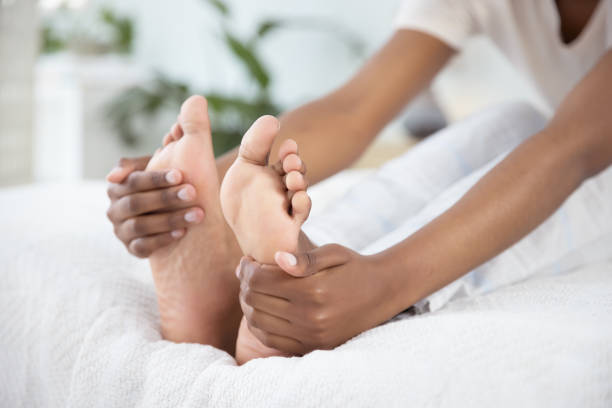
It’s estimated that over 80 percent of Americans experience some kind of issue with their feet every year. Unfortunately, most people ignore what’s going on with their feet until there’s an injury or serious pain. However, there are definite benefits to checking what’s going on with your feet. One of them is that you might get a hint about how your overall health is doing.
10 Foot Problems That Need Your Attention
1. Your Feet Are Always Cold
Consistently cold feet might be a sign that you’re having circulatory issues. Since these issues can be caused by a variety of factors so you might not need a doctor’s help. For example, smoking can affect your circulation. On a more serious level, peripheral artery disease, diabetes, and Raynaud’s disease can constrict your blood flow.
2. Your Feet Swell Suddenly
Wearing the wrong shoes and standing for a long time are just a couple of harmless instances that can cause swollen feet. However, sudden swelling in your feet can be a sign of kidney disease, arthritis, congestive heart failure, and gout, among other conditions.
3. You’re Feeling Burning Pain
Burning pain is one of the foot issues that you should never ignore. While a superficial fungal infection can be the cause, you might also have burning pain from nerve damage (neuropathy) and peripheral artery disorder (PAD).
RELATED: Wearing the Wrong Shoes? The Impact Could Be Worse Than You Think
4. Your Toenails Are Bent
The first thing to note is that your nails can get discolored or deformed from an injury. However, nail fungus, psoriasis, anemia, and melanoma can also cause your toenails to change. The same can be said if you notice pitting or a spoon-shaped look.
5. Your Toes Change Color
If you have Raynaud’s disease, you may notice that your toes change color unexpectedly. This condition causes the arteries to narrow, which is evident when your toes become blue then red then back to their natural color.

6. Your Toes Hurt For No Reason
Though your feet can hurt because of an injury or standing for long periods, unexplained pain is another matter. You may feel pain in your big toe alone, in the smaller toes alone, in the sole, or the whole foot. The possible conditions can vary but you might have arthritis, tendonitis, a fracture, gout, or Morton’s neuroma.
7. Your Feet Are Always Itchy
The most common cause of persistently itchy feet is athlete’s foot. However, it’s also possible that you’re having an allergic reaction to a chemical that you’ve been exposed to. If you also see a rash, psoriasis is another possibility.
8. You Get Foot Spasms
Tired, overworked muscles can lead to foot spasms. In that case, all you’ll need is some rest. However, if that’s not it, you might be dehydrated, have poor circulation, or have a mineral imbalance.
9. You Have Sores That Won’t Heal
Though cuts on the foot can take a little longer to heal because of friction, healing should still happen within a reasonable time. If this doesn’t happen, you might be dealing with poor circulation from diabetes or nerve damage. Sometimes, a sore that won’t heal can be a sign that you’re dealing with a form of skin cancer.
10. You Have Numbness Or Tingling In Your Feet
If your feet constantly feel like they’ve fallen asleep, you should check it out with your doctor. It could mean that you’re dealing with diabetes, neuropathy, spinal stenosis, or even a Vitamin B12 deficiency.
RELATED: 3 Tips To Relieve Tired, Achy Feet

When You Need A Doctor
Some foot issues like mild pain and blisters can often be treated at home. You can also adjust your lifestyle or diet to account for certain problems. However, there are times when you need to see a doctor to address an underlying condition. If these conditions are left untreated, they’re likely to progress and your health will get worse.
Some foot issues such as having a fever over 100 °F, seeing worsening swelling, having significant pain, being unable to put pressure on the foot, having oozing sores, or having a wound that’s tender when touched are indicators that you need to see a doctor. You should also tell your doctor about any other changes in your health as they might be related to the condition.
Your feet put in a lot of work every day but they often go overlooked. The best thing you can do is take care of them as much as possible. Apart from checking your feet regularly, it’s a good idea not to ignore persistent issues. Those issues can be a sign that something else is wrong.







